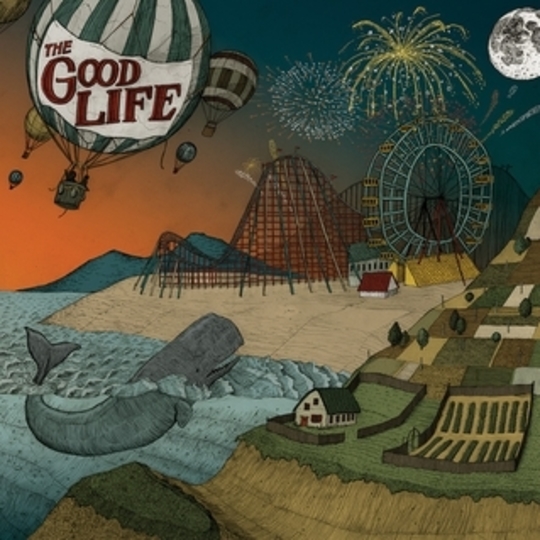In explaining Everybody’s Coming Down to Paste Magazine, The Good Life bandleader Tim Kasher discusses how difficult it is to really live life in the present, acknowledging a ‘certain limbo between what was and what’s going to be.’ He concludes by calling the album part of ‘an ongoing wallowing on ageing and death.’
He is not wrong, a fact that that plays directly into the record’s strengths and shortcomings. Strengths because Kasher’s eye for detail and melody remains as singular as ever, and shortcomings because at this point he has explored these themes - of solipsism and self-doubt; mortality, sexuality, artistic merit and existential crisis - on numerous occasions already.
The Good Life are much more than just Kasher’s acoustic side-project from Cursive, mind, and that has never been quite as evident as it is on Everybody’s Coming Down, the band’s fifth album, and first in eight years. Ryan Fox’s guitar lines are dissonant, often blistering things, as on the album’s lead single and first song proper, ‘Everybody’, which brings to mind the burly squall of Superchunk and Pinkerton-era Weezer, while ‘Flotsam Locked into a Groove’ channels pre-Good News for People Who Love Bad News Modest Mouse in rickety, repetitious spirit. Stefanie Drootin-Senseney’s bass playing is fluid and melodic throughout, both anchoring these songs and adding to them glinting new facets - see ‘Skeleton Song’ in particular - and her backing vocals have become an integral part of the band’s sound.
Speaking of which, for all those reference points, the band sounds defiantly like itself here. Help Wanted Nights, from 2007, was a gem of an LP in which its group’s members coalesced perfectly. Nearly a decade later (during which time each member has engaged in various other projects), it is impressive how Everybody’s Coming Down builds on that to create something more aggressive and adventurous yet undoubtedly the work of the same four players. (The line-up solidified around the release of 2004’s Album of the Year and is rounded out by Roger L. Lewis on drums.)
The central conceit of Everybody’s Coming Down is looser than the calendar year or week in a small town that its preceding two work from. It opens with ‘7 in the Morning’ and closes as ‘Midnight Is Upon Us’, fittingly so for a record so preoccupied with mortality. There is a halfway point in which these songs’ melody recurs, and the whole thing is designed to play as a constant loop, wherein its closing seconds seamlessly match those of its opening.
This kind of attention to detail and adherence to form is what makes Kasher’s work so compelling. In the early 2000s Cursive were a band at the height of their powers, as seen on the unassailable Domestica and The Ugly Organ, but the consistency of Kasher’s projects in the years since then has been less documented: 2003’s Happy Hollow is a superb deconstruction of the American Dream, while 2009’s Mama, I’m Swollen and 2012’s I Am Gemini are both terrific, terrifically dark pieces of work; a study in desolation and a gothic folk tale rendered in bludgeoning tones respectively. 2010’s The Game of Monogamy - the first to be released under his own name - is also notable for housing ‘Strays’, easily the sweetest and most heartening song Kasher has ever written.
As deliberately blunt as Kasher’s lyrics sometimes are in Everybody’s Coming Down, they are often striking and evocative (how fog causes ghosts to lurk in the garden in ‘7 in the Morning’, for example). It all comes down to whether you think the contemplation of what it is to write and sing songs found in ‘The Troubadour’s Green Room’ furthers the questions asked in The Good Life’s ‘Entertainer’ or Cursive’s ‘Art Is Hard’ and ‘What Have I Done?’ or simply rehashes them; likewise the jaded view of relationships presented in ‘How Small We Are’ with basically all of The Game of Monogamy and countless other songs. This album suggests that there’s gas in the tank yet, especially when such pondering is matched to the spiky, inventive instrumentation on display. The relentless negativity of ‘Flotsam Locked into a Groove’ and ‘Skeleton Song’ can be wearying, though: to labour an already tired metaphor, Kasher could be running on empty before long.
The punchy ‘Ad Nausea’ doesn’t hold back: “All my life I’ve felt such discontent / For every big achievement, each award, each encore / I assume this gloom stretches to my deathbed” he begins, against a jagged riff. The song closes with the assertion, oft-made elsewhere, that “I could give a shit and I’m calling it art.” This jars with how prolific and committed a frontman Kasher is; one who seems to have a ball at shows. He admits to coming off more cynical in his lyrics than he presents himself in everyday life, something keenly felt on ‘Ad Nausea’, the penultimate song on the record. It’s a darkest hour, perhaps, before ‘Midnight Is Upon Us’ lets a little light in to close proceedings. “I wish you’d lie to me tonight,” he beseeches a lover (after spying “the spectre with his scythe”); “Hold me and tell me I’m not so bad / Tell me I made some sort of difference / That our love is more than chance / Oh, I’m coming down.”
It depends on your interpretation, I suppose (and I did say a little), but just the mention of that word ‘love’ there implies - the doubt and the regret and the overthinking aside - that Kasher recognises that not all is futile; that though we may be coming down, we’re not in this alone.
-
7James Skinner's Score






















